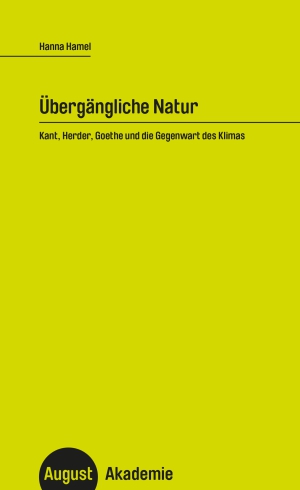While everyone is talking about the climate, with the dawn of the Anthropocene the time of nature seems to be passé. But without the concept of nature, much of modern philosophy would be unthinkable. In her study, Hanna Hamel mediates between historical positions of the late 18th and early 19th centuries and ecological theories of the present. Her reading of selected texts by Kant, Herder, and Goethe develops basic features of a historical-theoretical self-understanding that leads beyond the mere demarcation of "modern" concepts of nature. In the confrontation with current reflections by Bruno Latour, Timothy Morton, and David Lynch, a concern becomes recognizable that connects all positions. With Goethe it can be described as a representation and theorization of a "transient" nature. The historical texts become a critical resource for the present.
Hanna Hamel heads the transfer project on "Neighborhoods in Contemporary Berlin Literature" at the Leibniz Center for Literary and Cultural Research.
"In her book, the author makes a methodologically stimulating attempt to trace dialogues between temporally and conceptually different authors in the light of a dynamic thematization of the concept of nature. The result of this investigation is a convincing theoretical demonstration, combined with aesthetic considerations, that, in contrast to uniform posthumous categorizations, it is only through transitions between different positions that it is possible to make epistemological connections visible that would not be possible from a single perspective." – Laura Dequal, Universa. Recensioni di filosofia







